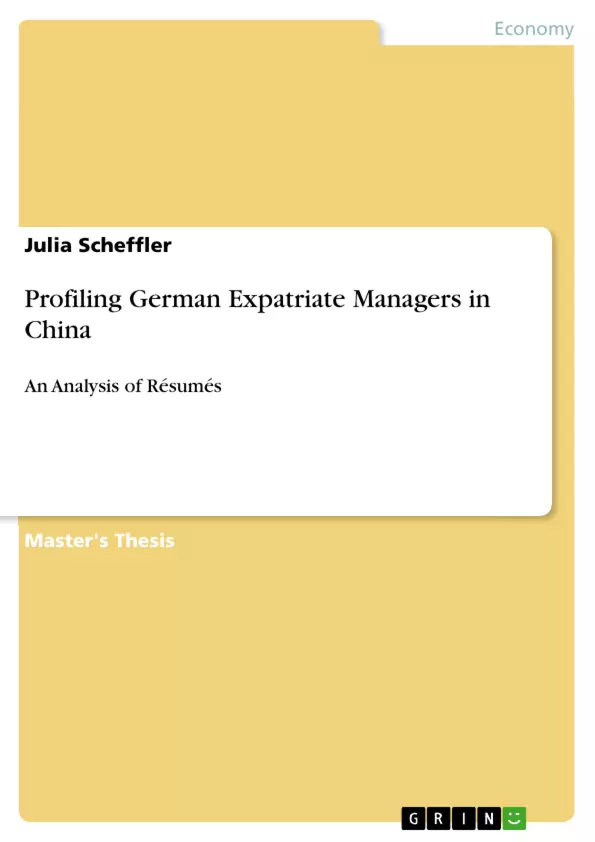This paper strives for investigating the phenomena of expatriates focusing on German expatriates in China. There are several reasons for this. Regarding the main destination of expatriates, which are mainly from Western countries, one third of all assignees have Asia as destination. In Asia, there are huge emerging markets to be explored by MNCs such as China where Western countries have spent FDI for decades already. China is at a “stage of dramatic transition towards a more market-oriented economy.” Moreover, the human resource management stands high on the agenda not only for foreign but also for Chinese companies expanding abroad.
Regarding the conceptual framework it can be seen that much research is done exploratory with surveys and questionnaires, and there are also some case studies. This survey study will also have an exploratory character preparing the ground for following empirical research. However, this thesis concentrates on the evaluation of CVs that have been voluntarily uploaded in the internet. This method of analyzing résumés is seen beneficial particularly until now in the social sciences. This study therefore deals with two important, not yet sufficiently answered research questions:
A) What is the typical demographical profile of a German expatriate in China?
B) What is the typical career profile of a German expatriate in China, respectively what position and function he or she obtains in China?
Chapter 2 deals with the conceptual part of data collection and how the data was processed. In the two chapters thereafter, the results of the study are presented by providing answers to the research questions. Chapter 3 clarifies the typical demographical profile of a German expatriate in China, whereas Chapter 4 highlights the working experience, respectively the typical job profile. Chapter 5 will then summarize the findings and provide outlook as well as recommendations for companies. The next subchapter, however, will start to provide a general outlook on the topic of managing expatriates touching the most important topics.
Inhaltsverzeichnis (Table of Contents)
- 1 Expatriates in IHRM - an Introduction
- 1.1 Research on Expatriates
- 1.2 Demographic studies about managers
- 2 Data Collection and codification
- 2.1 Data collection and input
- 2.2 Codification
- 2.2.1 Codification of Demographic Variables
- 2.2.2 Position, Function, Industry and Mobility
- 2.2.3 Clustering of Countries
- 3 Results - The Typical Demographic Profile
- 3.1 Age and Gender
- 3.2 Marital Status and Children
- 3.3 Educational Background
- 3.4 Study Sojourns and Internships abroad
- 3.5 Foreign Language Abilities
- 4 Results - the Typical Career Profile
- 4.1 Position, Function and Industry during the Career Life
- 4.2 The Expatriate Assignment
- 4.3 Mobility and other Findings
- 5 Conclusion
- 5.1 Summary and Recommendations
- 5.2 Outlook and Implications for further Research
Zielsetzung und Themenschwerpunkte (Objectives and Key Themes)
This Master's thesis aims to profile German expatriate managers in China by analyzing their résumés. The study seeks to understand the typical demographic and career profiles of these managers, as well as to identify any key trends or patterns in their experiences.
- Demographic characteristics of German expatriate managers in China
- Career paths and mobility patterns of German expatriate managers in China
- The role of cultural factors in the experiences of German expatriate managers in China
- The impact of expatriate assignments on the careers of German managers
- Implications for international human resource management (IHRM) practices
Zusammenfassung der Kapitel (Chapter Summaries)
Chapter 1 introduces the topic of expatriates in international human resource management (IHRM) and reviews relevant literature on expatriate research, particularly focusing on demographic studies of managers. Chapter 2 outlines the methodology used for data collection and codification. It details the process of collecting and inputting data from résumés and explains the codification process for various demographic variables, position, function, industry, and mobility. Chapter 3 presents the typical demographic profile of German expatriate managers in China, covering aspects such as age, gender, marital status, children, educational background, foreign language skills, and experiences with study sojourns and internships abroad. Chapter 4 dives into the typical career profile of these managers, examining their positions, functions, and industries across different stages of their careers, including their pre-assignment, assignment, and post-assignment roles. It also explores their mobility patterns and other notable findings.
Schlüsselwörter (Keywords)
This thesis focuses on German expatriate managers in China, international human resource management (IHRM), demographic characteristics, career profiles, cultural factors, mobility patterns, expatriate assignments, and international joint ventures.
Frequently Asked Questions
What is the typical profile of a German expatriate manager in China?
The study analyzes demographic factors like age, gender, marital status, and education to build a typical profile based on voluntarily uploaded résumés.
Why is China a major destination for expatriates?
China is a massive emerging market in dramatic transition toward a market-oriented economy, attracting significant Foreign Direct Investment (FDI) from Western countries.
What career paths lead to an expatriate assignment in China?
The research examines positions, functions, and industries held by managers prior to their assignment, highlighting the importance of previous international experience and mobility.
How important are foreign language abilities for these managers?
The study specifically evaluates the language skills listed in CVs as a key component of the expatriate's professional profile.
What methodology was used to collect data for this thesis?
The author utilized an exploratory approach by evaluating and codifying CVs (résumés) that were voluntarily published on the internet.
What are the implications for International Human Resource Management (IHRM)?
The findings provide recommendations for companies on how to better select and manage expatriates for successful assignments in the Chinese market.
- Quote paper
- M.sc. Julia Scheffler (Author), 2009, Profiling German Expatriate Managers in China, Munich, GRIN Verlag, https://www.grin.com/document/144335



